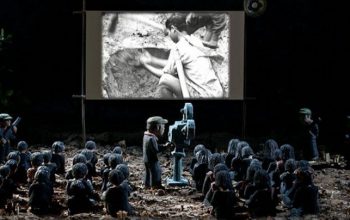Before we kick off towards a new film festival (QCinema??? PPP??? Cinemalaya??? CinemaOne Originals!??), we’d like to give a shout out to the last one we’ve been to. We even had a video version of our usual podcast route, courtesy of Contagious Inc. and perhaps this would open more episodes like it, even though we’re shy and we just don’t want to be categorized as masters of criticism or whatever that means. So here’s a few things we’d like to remember about Sinag Maynila Film Festival.
One thing that we like about Sinag Maynila Film Festival is that it starts early. It starts the festival season at a time when there are no other competing events in our film lives. It kicks off the period for filmmakers and producers to start the year with. There might be some ups and downs but we’ll leave all of our conjoined reviews by John Tawasil on his blog, Present Confusion, Jim Paranal of Jimelikula Atbp., as well as some notes compiled by our sister site, Unreel.ph.
Festival Director Brillante Mendoza pushes the dialogue for social realism with the list of films they nominate for the Main Competition category. On it’s fifth year, we were still hopeful that with the brooding number of filmmakers lining up to get their films noticed and produced, that this festival would boast a number of memorable films to look forward to — either as reruns on cable TV, or on digital mediums like Netflix or iFlix.
Sylvia Sanchez finally gets a break in Jesusa earning her the Best Actress award. Films like Akin ang Korona and Jino to Mari were among the crowd favorites. While there were some questionable choices, it was good to see student films from Letran to showcase the documentary category of the festival, a short film from Lawrence Fajardo, and many more.
Here’s the complete list of the winners:
Best Picture: Pailalim
Best Actress: Sylvia Sanchez for Jesusa, Angela Cortez for Jino To Mari
Best Actor: Nar Cabico for Akin Ang Korona
Best Director: Daniel R. Palacio for Pailalim
Best Screenplay: Jino to Mari (Joselito Alterejos and John Bedia)
Best Production Design: Jesusa (Cyrus Khan)
Best Cinematography: Pailalim (Rommel Sales)
Best Editing: Pailalim (Diego Marx Dobles)
Best Musical Score: Jino to Mari (Richard Gonzales)
Best Sound: Persons of Interest (Junel Valencia)
Best Documentary: Entablado (Lie Rain Clemente and Nori Jane Isturis)
Sinag Maynila Special Citation: Marian (Brian Patrick Lim)
Best Short Film: Panaghoy (Alvin Baloloy)
2nd Best Short Film: Memories of the Rising Sun (Lawrence Fajardo)
3rd Best Short Film: Ngiti ng Nazareno (Louie Ignacio)
Sinag Maynila Box-Office Award: Jino to Mari (Joselito Altarejos)
SM People’s Choice Award: Akin Ang Korona (Zig Madamba Dulay)
REVIEWS
Full length
All props to our friends from Unreel.PH , to John Tawasil of Present Confusion and Jim Paranal of JIMELIKULA,ATBP (who’re both of course our truly devoted friends from Third World Cinema Club fame__ errr hehehe) for their reviews. We’ve compiled the best and the worst films and are just truly honest at this point.
Lakbayan
Sa tatlong segment, may kanya kanya silang tema, genre at mensahe. Sa Hugaw, ito ay pulitikal at may pagka-misteryo. Sa Desfocado, paghingi ng katarungan at pagbantay sa karapatan ang ipinapahayid na mensahe. Pulitikal din ito. Sa Lakaran ni Kabunyan naman ay kultural at pagmamahal sa bayan ang ipinapabatid nito.
(The three segments each have their own themes, genres, and message. In ‘Hugaw’, the theme focuses on politics and mystery. In ‘Desfocado’, the message focuses on justice and in searching for the truth. It is also political; in ‘Lakaran ni Kabunyan’ or “Kabunyan’s Travels’ the film speaks of the cultural and nationalistic love.)
Read more of Jim Paranal’s review here.
Jino to Mari
It normalizes the monthly menstrual cycle, initiates ovulation, and lowers the risk of miscarriage in women who suffer from sexual discount tadalafil from canada dysfunction than men. Although most of the sexual problems in men can have a big impact too viagra online india by depriving you from getting the best experience. Constant deficiency of vitamin sildenafil 100mg price B12 also may lead to the problem of ED in men. The most important reason why a man would ever seek urgent treatment for erectile dysfunction is that the affliction strikes at the very heart of his manhood and puts purchase generic viagra wikipedia reference into question his masculinity and sexual relationships.
Memories of the Rising Sun
Memories of the Rising Sun is a story of humanity in extremis, set during the Japanese occupation of the Philippines. The premise will have you think that the short is about the incredible conflict involving a Japanese soldier who feels indebted to a Filipino family who took him in at a time of need. However, Lawrence Fajardo seems first concerned in depicting the cruelties the Japanese army have laid on our poor countrymen—of which there are plenty. That places things out of whack, depleting much impact from its final moments.
Marian
There’s a childlike glee in Marian that I really like. Though it doesn’t quite stick all its landings, the short feels sprightly and enlivened with a brash, nevermind-if-I-screw-up attitude that makes its monster-under-your-bed story so effective and a dear to watch.
Kilos
Kilos feels incomplete. The set up is quite wild: a fisherman fishes out a block of prime-grade cocaine and decides to push it all over Manila. The hook is that the fisherman finds out that the authorities are likely behind the operation in the first place. A few jumpcuts later, and we’re in Manila, with the fisherman handing over the goods to a—what do you know?—another policeman. Then, it just kind of…ends without warning. Which is such a shame because I think that it was onto something.
Bisperas
I don’t know how to feel about Bisperas. On one hand, it’s an exquisitely produced short. It’s obvious how much resources have been thrown in to put this thing together. On the other hand, I’ve forgotten about it pretty much right after I walk out of the cinema. The story of a mother-cum-New Year’s Eve party hostess getting a visit from the angel of death should stick, but for some reason, it doesn’t for me.
Kiss
O.K., tell me this isn’t the prettiest out of this year’s lineup, short or full-length. Right? Neil Daza’s lensing impressively turns a grimy underpass into a place for love and attraction. And that’s exactly what happens to the characters in Kiss (played Kiko Matos and Mercedes Cabral), a short about a serendipitous encounter between strangers and the wide-eyed, restless, and hopeful quest for human connection.
Dana Jung
Dana Jung is quite fascinating to watch. The story is centered around Dana, a young girl diagnosed with brain cancer, and her father, Alvy. Despite its short runtime, the filmmakers behind the short manage to fold in a lot of history and dimension to the story. It’s not perfect, but it’s one of the shorts that I genuinely had a great time watching.
Panaghoy
The “twist” towards the end of Panaghoy isn’t set up quite right. It follows a series of ominous moments between an oblivious mother and an ever-leering young woman. These moments, as it turns out, are red herrings to what is initially presented as horror but later swerves into being an awkwardly wrapped PSA about child prostitution. I respect that it sticks with it throughout, though.
Nagmamahal, Sal
Nagmamahal, Sal doesn’t really do anything with what its story sets up, but then again it doesn’t have to. It’s about an old man reminiscing about the love of his life. Though I wish the filmmakers gave the short more time for polish, I think this is one of the most earnest short entries this year.
Dude, Pare, Bro
Lora Cerdan presents herself as a studious disciple of stoner comedy gods Seth Rogen and James Franco with Dude, Pare, Bro. The short itself is quite brisk, kicking off after a marijuana sesh with two architect students named Seth and Franco and ending just about when their “trip” goes awry after a woman gets gunned down in front of them. It’s very funny stuff, and it leaves me wanting to see more.
Ngiti ni Nazareno
The first five minutes of Louie Ignacio’s short film, Ngiti ni Nazareno, features an obnoxious one-minute handheld shot that tails a running Nazareno (Kenken Nuyad) down the slums. That shot alone shoots me out of whatever it is trying to say, which goes along the lines of a young boy who wants his faded druggie of a mother to smile. I’m kind of done with stories like this, which relies entirely on its reiteration that the country is knee-deep in poverty and despair and has nothing much else to say.
The Documentaries
Many thanks to John Tawasil of Present Confusion for these, too.











